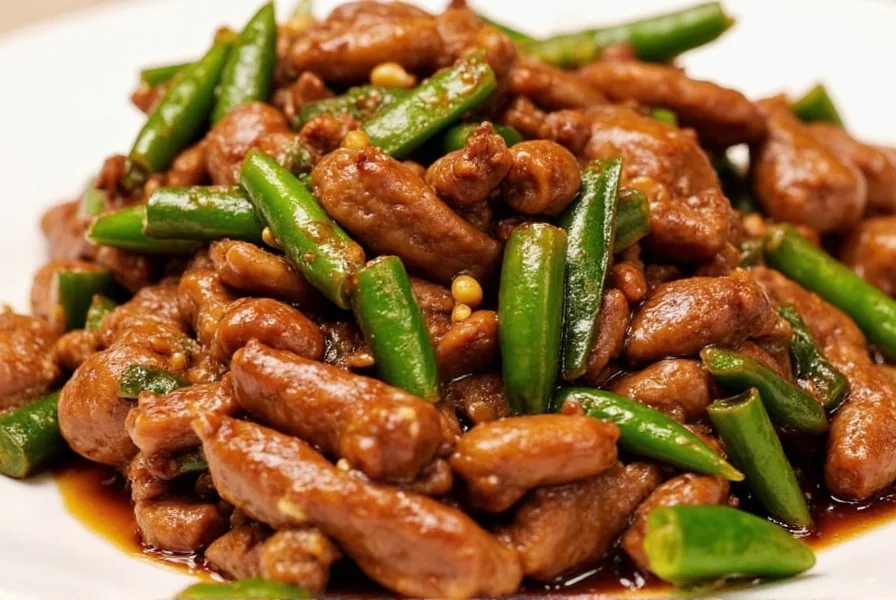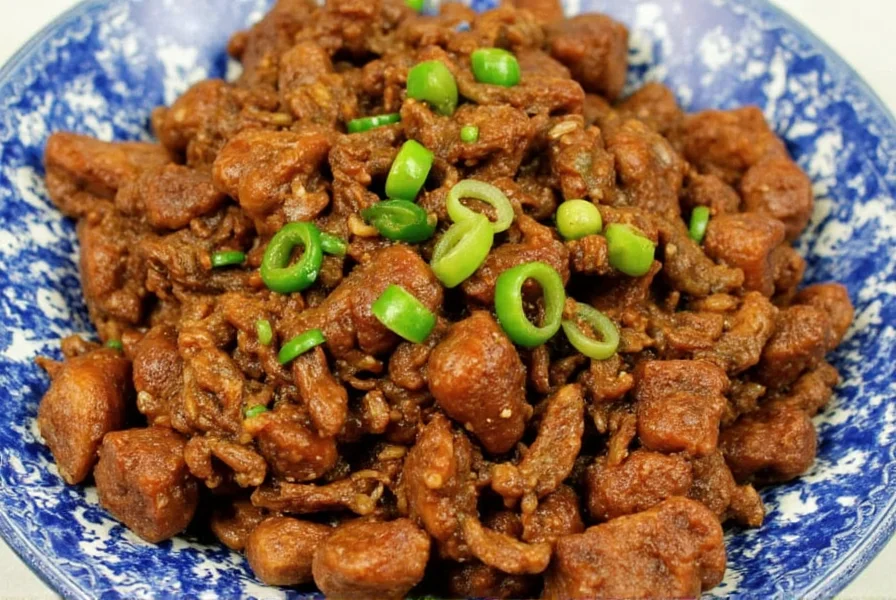The best ginger beef recipe combines tender beef strips with a savory-sweet sauce featuring fresh ginger, garlic, and soy. For authentic results, use flank steak cut against the grain, marinate for 30 minutes, and cook in high-heat stir-fry style. Total preparation takes 15 minutes with 30 minutes marinating time, yielding 4 servings. Key ingredients include 1.5 lbs flank steak, 3 tbsp fresh ginger, 3 garlic cloves, 1/4 cup soy sauce, 2 tbsp rice vinegar, and 2 tbsp brown sugar.
Perfect Ginger Beef: A Flavorful Stir-Fry Classic
Ginger beef has become a beloved dish in Chinese cuisine and its Western adaptations. While authentic versions focus on simplicity and fresh ingredients, Canadian-Chinese restaurants popularized a sweeter, crispier variation that's equally delicious. This recipe bridges both traditions, delivering tender beef with vibrant ginger flavor without excessive sugar or artificial ingredients.
Why This Ginger Beef Recipe Works
Many ginger beef recipes fail by using dried ginger instead of fresh, overcooking the beef, or creating a sauce that's either too sweet or too salty. This version succeeds because:
- Uses freshly grated ginger for maximum flavor impact
- Incorporates a simple cornstarch slurry for perfect sauce consistency
- Includes velveting technique for restaurant-quality tender beef
- Balances sweet, salty, and tangy elements authentically
- Provides clear timing to prevent overcooking
Essential Ingredients for Authentic Flavor
The magic of ginger beef comes from quality ingredients. Don't substitute dried ginger for fresh—this dish lives or dies by its ginger component.
| Ingredient | Amount | Preparation Notes |
|---|---|---|
| Flank steak | 1.5 lbs | Cut against the grain into 1/4-inch strips |
| Fresh ginger | 3 tbsp | Finely grated (not minced) |
| Garlic | 3 cloves | Minced |
| Soy sauce | 1/4 cup | Use reduced-sodium for better control |
| Rice vinegar | 2 tbsp | Essential for bright flavor |
| Brown sugar | 2 tbsp | Packed |
| Sesame oil | 1 tsp | Add at the end for aroma |
Equipment You'll Need
Having the right tools makes this authentic ginger beef recipe achievable in any home kitchen:
- Carbon steel or cast iron wok (or large heavy skillet)
- Sharp chef's knife for precise cutting
- Mandoline slicer (optional but helpful for uniform beef)
- Small bowls for mise en place
- Wooden spoon or metal spatula
Step-by-Step Cooking Instructions

Preparing the Beef
- Partially freeze the flank steak for 45 minutes to make slicing easier
- Cut against the grain into 1/4-inch thick strips
- Combine beef with 1 tbsp soy sauce, 1 tbsp rice wine, and 1 tsp cornstarch
- Massage gently and marinate for 30 minutes at room temperature
Making the Sauce
- Whisk together 3 tbsp soy sauce, 2 tbsp rice vinegar, 2 tbsp brown sugar, 1 tbsp rice wine, and 1 tsp cornstarch
- Add 1/4 cup water and set aside
Stir-Frying Process
- Heat wok over highest heat until smoking
- Add 2 tbsp vegetable oil and swirl to coat
- Cook beef in single layer for 1 minute per side (work in batches)
- Remove beef and set aside
- Add 1 tbsp oil, then ginger and garlic, stir-frying for 30 seconds until fragrant
- Return beef to wok, pour sauce over, and toss for 60-90 seconds until glossy
- Finish with 1 tsp sesame oil and serve immediately
Pro Tips for Restaurant-Quality Results
Master these techniques to elevate your ginger beef recipe from good to exceptional:
- Velveting the beef: The cornstarch and rice wine marinade creates a protective layer that keeps beef tender during high-heat cooking
- Ginger preparation: Grate ginger on a microplane for maximum surface area and flavor release
- Wok temperature: Your wok must be extremely hot before adding ingredients to prevent steaming instead of searing
- Sauce consistency: If sauce thickens too much, add 1 tbsp water at a time until desired consistency
Common Mistakes to Avoid
Even experienced cooks make these errors with ginger beef recipes:
- Using dried ginger: Powdered ginger lacks the bright, spicy notes of fresh ginger
- Overcrowding the wok: Causes steaming instead of searing—cook in batches
- Marinating too long: Acidic ingredients can start to "cook" the beef if left too long
- Adding sauce too early: Sugar in the sauce burns quickly at high heat
Serving and Storage Recommendations
Ginger beef tastes best fresh but stores well with proper technique:
- Serve immediately over steamed jasmine rice or with vegetable fried rice
- Garnish with sliced green onions and sesame seeds
- Store leftovers in airtight container for up to 3 days
- Reheat gently in skillet with 1 tsp water to restore moisture
- Do not freeze—texture deteriorates significantly

Popular Recipe Variations
Adapt this base ginger beef recipe to suit different dietary needs and preferences:
- Gluten-free version: Substitute tamari for soy sauce and ensure rice vinegar is gluten-free
- Low-sugar option: Reduce brown sugar to 1 tbsp and add 1/2 tsp xylitol for sweetness without blood sugar impact
- Authentic Chinese style: Omit sugar completely and increase rice vinegar to 3 tbsp for more savory profile
- Canadian-Chinese style: Double the sugar and add 1/4 cup pineapple juice for that familiar restaurant taste
- Veggie-packed version: Add bell peppers, broccoli, and snap peas during the last minute of cooking
Frequently Asked Questions
What cut of beef works best for ginger beef?
Flank steak provides the ideal balance of flavor and tenderness when properly sliced against the grain. Sirloin or ribeye work as alternatives but may be more expensive. Avoid tougher cuts like chuck that won't tenderize sufficiently in quick cooking.
Can I make ginger beef without cornstarch?
Yes, but the sauce won't have the traditional glossy texture. Substitute arrowroot powder at a 1:1 ratio, or reduce the liquid by half and simmer longer to naturally thicken. The cornstarch in the marinade is more critical for tenderizing—replace with baking soda (1/4 tsp) if avoiding cornstarch completely.
How do I prevent my ginger beef from becoming tough?
Three key techniques prevent toughness: 1) Cut against the grain into thin strips, 2) Use the cornstarch-rice wine marinade for 30 minutes, and 3) Cook over extremely high heat for no more than 1-2 minutes per side. Never cook the beef beyond medium-rare for best texture.
Why does my ginger beef sauce turn out too sweet?
Many recipes overemphasize sweetness, especially Westernized versions. For authentic flavor balance, maintain a 2:1 ratio of soy sauce to sweetener. If your sauce is too sweet, add 1 tsp rice vinegar or a squeeze of fresh lime juice to restore balance. Remember that brown sugar continues to caramelize during cooking, intensifying sweetness.
Can I prepare ginger beef ahead of time?
Marinate the beef up to 24 hours in advance for enhanced tenderness, but don't combine with the sauce until cooking. Prepare all ingredients (mise en place) ahead of time since stir-frying happens quickly. The complete dish doesn't reheat well, so plan to cook it just before serving for optimal texture and flavor.











 浙公网安备
33010002000092号
浙公网安备
33010002000092号 浙B2-20120091-4
浙B2-20120091-4